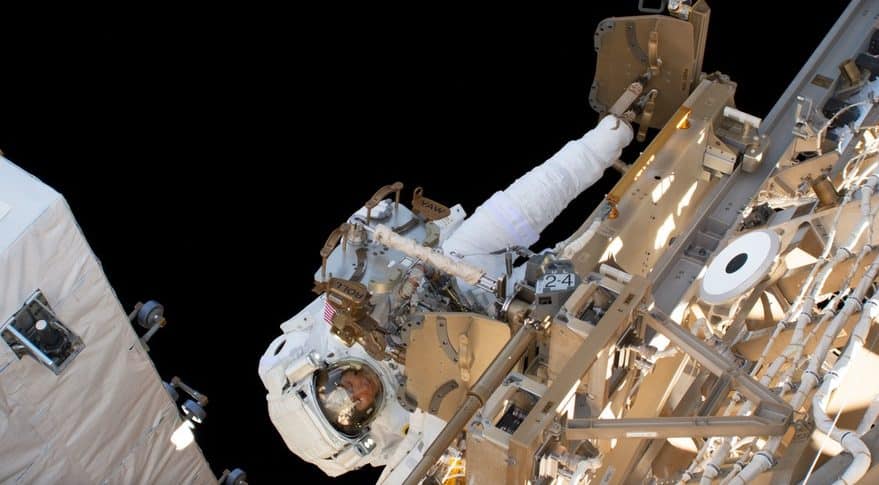
As NASA gears up for a lengthy series of spacewalks to perform repairs on the International Space Station, the agency is seeking input on plans to produce a new generation of spacesuits needed for the moon.
At an Oct. 4 briefing, NASA officials outlined plans to conduct 10 spacewalks outside the ISS over the next two to three months. The first five will be devoted to the replacement of batteries for the station’s power supply, while the second five will be used to repair the Alpha Magnetic Spectrometer instrument on the station’s exterior.
“It’s really exciting and highly technically challenging,” Kirk Shireman, NASA ISS program manager, said at the briefing at the Johnson Space Center. “All that’s going to happen over the next two or three months.”
The spacewalks will begin Oct. 6, with astronauts Christina Koch and Andrew Morgan beginning the process of replacing nickel-hydrogen batteries on the far end of the station’s truss with lithium-ion batteries delivered to the station on a Japanese HTV cargo spacecraft last month.
Four more spacewalks are planned, currently scheduled for Oct. 11, 16, 21 and 25. Koch and Morgan will share the spacewalking duties with Jessica Meir and Luca Parmitano. One of the spacewalks, Oct. 21, will feature Koch and Meir, making it the first all-female spacewalk in the agency’s history.
NASA had planned to perform an all-female spacewalk in March featuring Koch and Anne McClain, but changed the lineup after McClain decided she would be more comfortable in a medium-sized suit, rather than a larger suit as previously planned. With only one medium-sized suit ready for use on the station at the time, NASA reshuffled spacewalk assignments.
This time, the suits are ready to support the spacewalks. Megan McArthur, deputy chief of the astronaut office, said at the briefing that all four astronauts are qualified for the battery replacement spacewalks, allowing station officials to mix up crews. Koch and Morgan will do the first two, she said, “because Christina has done similar work and been actually to this worksite.”
In an interview from the station earlier in the week, Koch and Meir said they were aware it would be possible for the two of them to be assigned to the same spacewalk, although no formal decisions had been made at that time. “What we’re doing now shows all of the work that went in to the decades prior, all the women that worked to get us where we are today,” Meir said. “It’s really nice to see how far that we’ve come.”
The second set of spacewalks, expected to begin in early November, will be different. All five will be done by Morgan and Parmitano because the work to repair the AMS requires special skills versus the more generic training that includes activities like battery replacements.
“The instrument wasn’t designed to be repaired in space, so unique tools had to be developed, unique procedures,” McArthur said. “We had to make our best guess of when the sequence of spacewalks would happen and then look to see which crews had time available in their ground training to give them that specialized training.”
The AMS, installed on the station on one of the final shuttle missions in 2011, has suffered the failure of all but one of the pumps in its cooling system, with that last working pump “showing the characteristic signature of failure,” Shireman said.
During the spacewalks, Morgan and Parmitano will install a new set of pumps and replenish its liquid carbon dioxide coolant, a process that will be complex since the AMS was never designed to be repaired in space. “Luca and Drew have been training extensively,” Shireman said. “It will be the most complicated set of EVAs I think we’ve ever done.”
Those spacewalks will be done with a set of spacesuits known as Extravehicular Mobility Units, or EMUs. NASA is in the process of developing a new version of the suit, the Exploration Extravehicular Activity Mobility Unit or xEMU, intended for use on future lunar landing missions, addressing a concern highlighted by outside experts, including the agency’s own Aerospace Safety Advisory Panel in its recent meetings.
NASA issued a request for information Oct. 4 seeking input from industry on how to manufacture the suits. NASA plans to develop initial xEMU models, including one that will be flown to the station for a 2023 test and the two that will be used on the Artemis 3 lunar landing mission in 2024. After that, NASA proposes to have industry build the suits, a process that could start as soon as late 2020, once the xEMU completes its critical design review.
The request for information seeks input on both spacesuit manufacturing as well as potential upgrades or other improvements to the suit, with responses due Nov. 4.
“With the help of partners from industry and academia, we have developed a suite of advanced spacesuit components in preparation for missions to distant destinations,” said Marshall Smith, director of the Human Lunar Exploration Program at NASA Headquarters, in an agency statement. “With the improvements to the suits for Artemis missions, astronauts can now open up new possibilities for science and exploration at the moon.”

